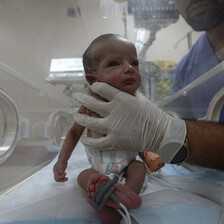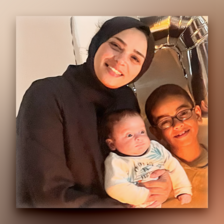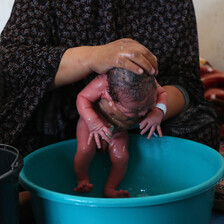The Electronic Intifada 26 April 2024

The crisis inflicted on Gaza’s healthcare system has major repercussions for pregnant women. (Ali Hamad / APA Images)
Prenatal assessment is essential for ensuring the health and wellbeing of both a woman and her future child.
Stress during pregnancy – and particularly stress caused by a war – can have adverse consequences.
Wars disrupt local services, making it harder to access essential healthcare. That worsens the situation of mothers and pregnant women.
Approximately 180 women give birth in Gaza every day. Just three of the 11 hospitals still partially functioning in Gaza provide maternal care.
I’m working in a recently established field hospital. It is situated in an area where people have limited access to clinics.
During conversations with patients, a woman in her eighth month of pregnancy told me that it was her first prenatal check-up.
Wasan is a name that will always stick with me both because of its rarity and because I now associate it with tragedy.
Wasan explained to me that she had missed four months of follow-up appointments as she had been displaced repeatedly during the current genocidal war. She visited the field hospital as she had not felt any movement in her womb over the previous 24 hours.
Sadly, no fetal heartbeat was detected during an ultrasound scan. That indicated she had undergone a miscarriage.
Breaking this news to Wasan was very difficult.
Heartbreaking
A pregnant woman named Halima was diagnosed with high blood pressure two weeks before Israel declared war on Gaza.
Due to challenges in accessing healthcare, Halima was unable to have the care she required as her pregnancy became more advanced.
She was brought to the emergency room in our field hospital complaining of a headache. It was attributed to increases in her blood pressure.
After being examined, Halima was diagnosed with pre-eclampsia, necessitating the preterm delivery of her baby.
It is highly likely that the baby will not be able to receive the care a baby would normally require as Gaza’s healthcare system has been under direct attack and placed under major strain.
The most heartbreaking case I have encountered was of a woman named Nuha.
She had fainted.
After we revived her, Nuha said, “I don’t want a doctor to examine me. I don’t want to give birth now. I just want to go and see my son Hasan.”
Barely an hour before Nuha arrived at the field hospital, Hasan had been martyred.
Nuha was brought to us by relatives as she had labor pains. She lost consciousness upon arrival.
These are a few snapshots of the suffering endured by pregnant women we care for every day.
There is an emergency in Gaza, especially for pregnant women. Unless there is a ceasefire and aid is allowed to reach all regions, we can expect an even worse situation.
Dr. Roba Almadhoun is an obstetrician in Gaza.





